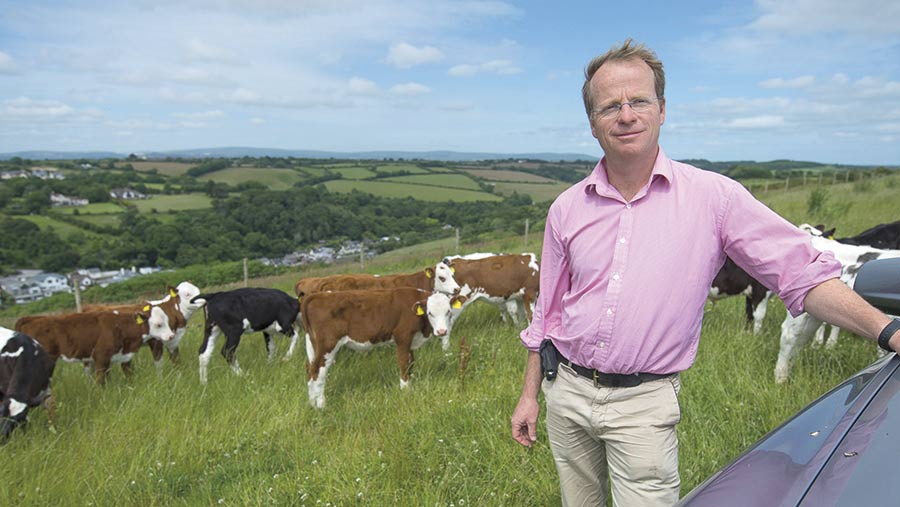How to use personality tests to hire and manage farm staff
Personality profiling sounds like something from a TV police crime drama but it is in fact a tool now commonly used in recruitment.
We find out how it works, how you can use it to improve communication with your farm workforce and we speak to a Devon farmer who has been using personality profiling for 14 years and believes it’s an extremely useful management tool.
See also: 4 step-guide to recruit and retain staff on your dairy farm
What is personality profiling?
Personality profiling asks an individual to rank a series of statements or words that best describe them. They are then assigned a personality type (a word, colour or code).
Why do it?
It gives you a better understanding of your own personality and how you might come across. It also gives you an understanding of the personality make up in the wider team.
It’s about understanding how to talk to people and how people like to be spoken to. The aim is to improve communication.
How to use it
Profiling can be used as part of the recruitment process on shortlisted individuals prior to interview. Questions can then be tailored depending on results.
It is also worth carried out on the whole team and particularly, managers. The whole process should be repeated when a new member of staff joins.
What are the different personalty profiling systems available?
There are numerous types of profiling systems, most of which are based around similar principles.
For example:
- DOPE 4-bird personality test – assigns you with a bird to highlight your personality (eg. owl)
- Myers-Briggs Type Indicator – assigns a combination of letters (eg. ISTJ – introvert, sensing, thinking, judging)
- TetraMap – assigns elements of the earth (eg. earth, fire)
- Vita – assigns adjectives (eg. team maker, visionary)
A dominance of earth on TetraMap or Visionary on Vita means that person can be direct and not open to change. This is a personality type that is often seen among farmers.
The most conflicting to this would be water on TetraMap or Team Maker on Vita. These individuals are sensitive, concerned about relationships and don’t want to be shouted at.
So a water personality type doing the calves may spend a lot of time doing it to a high standard, where as the earth character just wants them to hurry up and get on with jobs.
Key considerations when using a personality profile
Be sure to explain why you are doing it and the benefits that have been seen on other farms.
Some profiling systems are very lengthy. Choose a system that is brief and simple.
Working with an external person can be beneficial as they can explain results and offer advice on how to act.
Using the information
Act on the information. If the results show that you, as a manager, are not good at the emotional stuff and have a direct style, don’t use it as an excuse. Address it and try to improve.
If one of the team is sensitive and takes things personally, coach them not to take it so personally. It’s about meeting in the middle.
Case Study
Geoff Sayers, The Carswell Group, Plymouth

© Jim Wileman
Devon farmer and Farmers Weekly Dairy Farmer of the Year 2016 Geoff Sayers has been using personality profiling on his farm teams for 14 years and believes it’s an extremely useful management tool.
“It’s very useful for recruitment and team management and also for your own development so you match your own ambitions with a training plan,” he explains.
Mr Sayers uses Tetramap under the guidance of people consultant, Paul Harris of Real Success.
All staff, at every level of the farm team are profiled across the business’s three dairies, totalling 1,500 cows. The process is focused on the recruitment stage, but the personality profiles will be referred to if there’s ever any problems within the team.
Mr Sayers explains: “If at any point the teams aren’t performing, the first thing to do is look at the team. Maybe people aren’t happy or they’re clashing. At that point, the profiles come out.”
He believes a classic example of when a clash of personalities can occur is when a highly structure person works with a very flexible person that gets easily distracted. For example, this could cause issues in the parlour when carrying out parlour routines.
“If there’s a problem, you can sit down with them both, with their personality profiles and explain that they’re both different and ask whether you understand why Bob got annoyed last week? Then you can work to compromise and get some ground rules,” Mr Sayers explains.
“It’s a good conversation point and it’s a good way to understand the people you work with and understand that people get satisfaction from different things… It’s very easy to criticise people because they don’t do it your way. It’s just understanding that people work differently.”
Mr Sayers believes personality profiling could “100% be used more in farming businesses”. He has also learned about how to manage himself better by profiling.
He is a “very high fire, high earth” personality on TetraMap, which means he is creative, easily distracted and decisive.
“I don’t naturally lean towards routine and structure. I need to adapt myself to people that do like routine and structure,” he explains.
